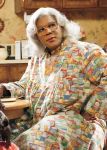by Erica Butler
For New Pittsburgh Courier
(NNPA)—Ahead of the national premiere of his latest project, writer and director Tyler Perry said recently he is weary of deflecting criticism that his work lacks substance and is not an authentic and constructive portrayal of Black Americans.
Perry’s latest film, “Madea’s Big Happy Family,” opened across the country April 22. He said during a Beverly Hills news conference April 19 that he is particularly irritated by criticism from Black filmmaker Spike Lee.
 |
| MADEA—In this publicity image released by Lionsgate, Tyler Perry portrays Madea in a scene from “Tyler Perry’s Madea’s Big Happy Family.” (AP Photo/Lionsgate, Quantrell D. Colbert)
|
“I’m so sick of hearing about damn Spike Lee,” Perry said, according to reports. “Spike can go straight to hell! You can print that. I am sick of him talking about me, I am sick of him saying, ‘This is a coon, this is a buffoon.’”
Lee has dismissed Perry’s artistic vision as low-brow entertainment which exploits a negative image—among them Perry, a Black man, dressing in drag for his role as Madea—for laughs and box office success.
Perry’s work has produced a string of hits and generated strong support from African-American moviegoers, built around the audience’s embrace of Madea.
“I am sick of him talking about Black people going to see movies,” Perry said of Lee’s criticism. “This is what he said: ‘You vote by what you see,’ as if Black people don’t know what they want to see.”
The feud between the two filmmakers dates back to 2009 when, in an interview with BET reporter Ed Gordon, Spike Lee compared Perry’s portrayal of Blacks in his films to “Amos n’ Andy,” the first Black situation comedy to be broadcast nationally in the 1950s and which contained stereotypical roles of African-Americans. Lee said that he does not expect Perry’s films to reflect Lee’s own vision of Black America, but he insists that “imaging” of the Black community is significant.
“Each artist should be allowed to pursue their artistic endeavors, but I still think there is a lot of stuff out today that is coonery and buffoonery,” Lee said in the interview. “I am a huge basketball fan, and when I watch the games on TNT, I see these two ads for these two shows [Perry’s “House of Payne” and “Meet the Browns”], and I am scratching my head. We got a Black president, and we going back to [early Black comedians] Mantan Moreland and Sleep ‘n’ Eat?”
Perry defended his work, pointing out that other ethnicities have their own versions of his films.
“I’ve never seen Jewish people attack ‘Seinfeld’ and say ‘this is a stereotype.’ I’ve never seen Italian people attack ‘The Sopranos.’ I’ve never seen Jewish people complaining about ‘Mrs. Doubtfire’ or Dustin Hoffman in ‘Tootsie,’” he said.
In his online journal at tylerperry.com, Perry wrote that his new movie is just food for the soul, and only his fans will understand his vision.
Critics “don’t get that this is about more than making a movie and telling a funny story,” he wrote on his site. He added that detractors “don’t get that it’s about uplifting and encouraging the soul. They don’t get that most [Perry film fans] have been with me long before they knew who I was, and they don’t get that you have my back.”
(Erica Butler is a staff writer for the Afro American.)